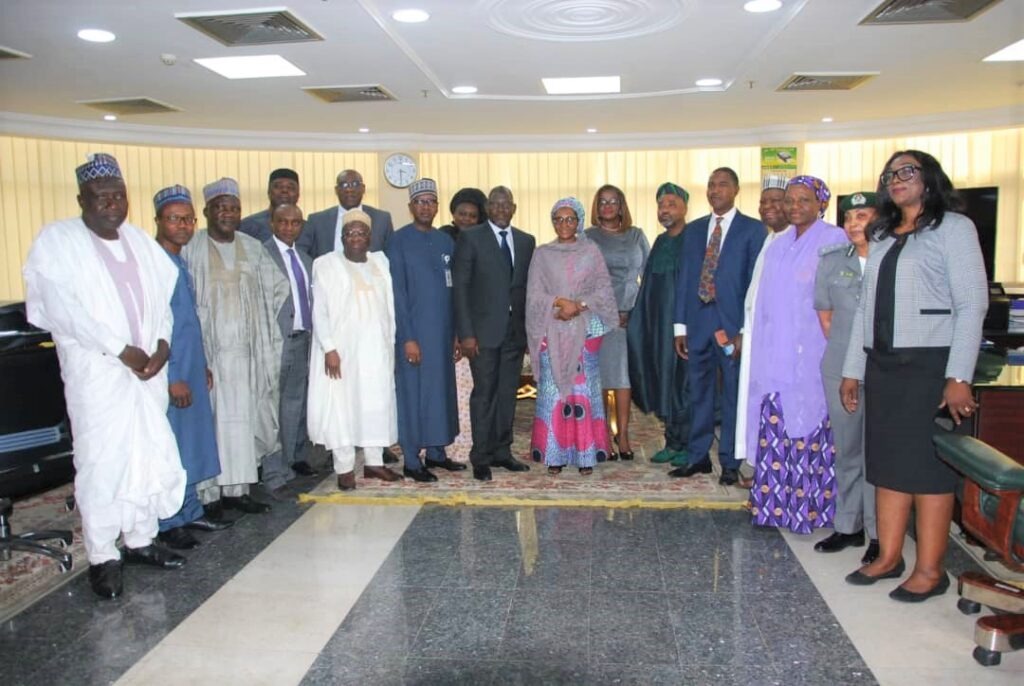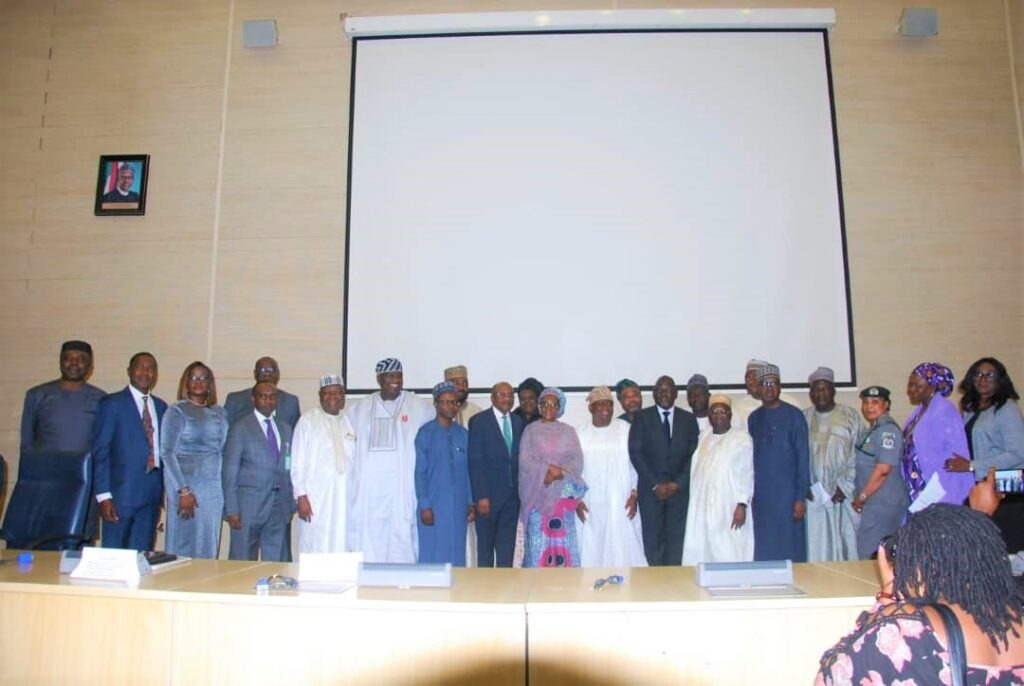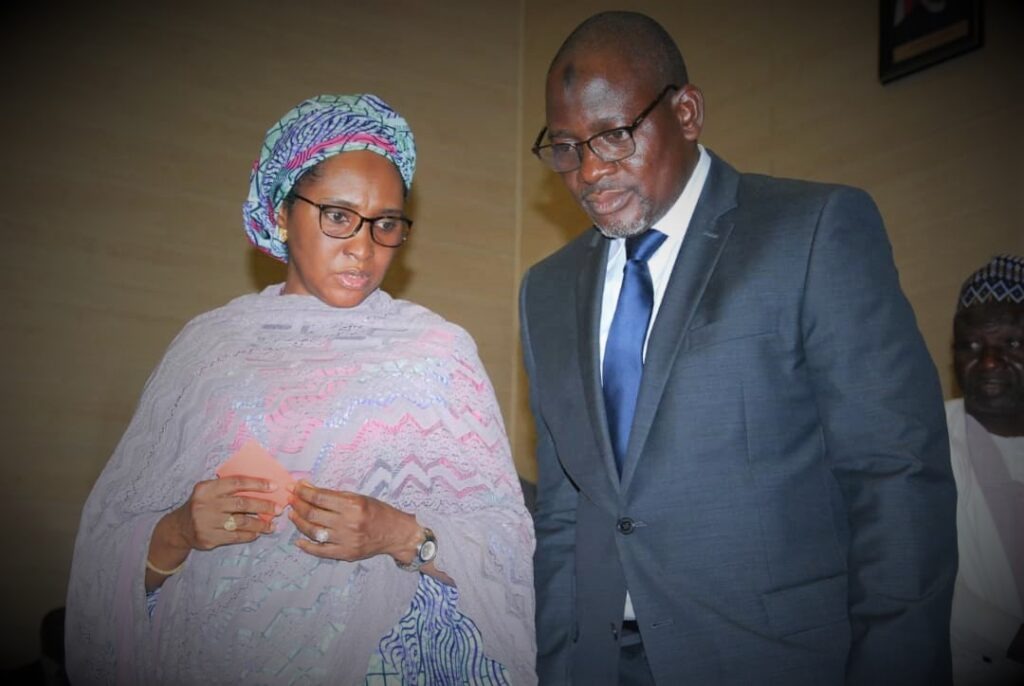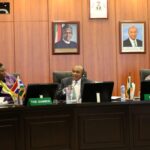Being a Board Member of Federal Inland Revenue Service (FIRS) comes with grave responsibilities. Indeed, under the FIRS (Establishment) Act, 2007, the Board is charged with various responsibilities, according to Mrs. Zainab S. Ahmed, Honourable Minister of Finance, Budget and National Planning.
In her Keynote Address at the inauguration of the Chairman and Members of FIRS Board held on Thursday, 16th January, 2020 in Abuja, Ahmed stated that the appointment of the Chairman and Members of FIRS Board is in line with powers conferred on President Muhammadu Buhari under the provisions of the FIRS (Establishment) Act, 2007.
Thanking Mr. President for conveying the names of the members of the FIRS’ Board to the National Assembly for confirmation in line with the provision of the FIRS (Establishment) Act, and expressing appreciation to the Senate for prompt confirmation of the Members of the Board, Ahmed said: “The inauguration of the FIRS’ Board could not come at a more critical juncture. The economy has clearly turned the corner, with real gross domestic product (GDP) growth increasing from 2.01 percent in the first quarter of 2019 to 2.28 percent in Q3 2019, reflecting the continuing improvements in economic fundamentals and our strategy of pursuing more diversified, inclusive and sustainable growth over the medium-term horizon. The improved security situation in various parts of the country has improved the business environment, providing greater income generating opportunities for businesses, and supporting the improvement in oil production levels.”
Speaking on the various responsibilities with which the Board is charged, Ahmed highlighted the following: Having overall supervision of the FIRS by providing general policy guidelines; Managing and superintending the FIRS’ policies on matters relating to the administration of the revenue assessment, collection and accounting system for taxes under applicable statutes; Reviewing and approving the FIRS’ Strategic Plan; Superintending over the employment, remuneration and disciplinary measures for FIRS’ employees in consultation with the National Salaries, Incomes and Wages Commission; and with the approval of the Minister of Finance, Budget and National Planning making rules and regulations that may be necessary or expedient for giving full effect to the provisions of the FIRS (Establishment) Act, 2007.

“We are confident that, under the oversight of this Board, the FIRS will continue its transformation into a premier revenue collecting agency, with a relentless commitment to enhancing good governance, probity, excellence and integrity in its operations, administration and management of the nation’s taxation system”, she said.
She also said that the macroeconomic trends and factors are extremely important to the revenue generating strategies, given the dependence of non-oil taxes (such as Companies Income Taxes and Value Added Taxes), on strong economic performance, increased investments by businesses as well as entrepreneurs, and higher income levels for consumers to support a robust demand for goods and services.
In this regard, the Strategic Revenue Growth Initiative (SRGI) articulates distinct strategies for improve domestic revenue mobilisation, under the Ministry’s mandate for domestic revenue mobilisation. “Specifically, under the SRGI, our strategies are targeting: Enhanced revenue to GDP ratios: Nigeria’s revenue to GDP has lagged well behind those of its international and continental peers, significantly undermining the Government’s ability to fund critical expenditures without an undue reliance on volatile oil revenues and excessive deficit financing. In this regard, we are committed to achieving a 15 percent revenue to GDP ratio over the medium-term horizon, up from six percent – eight percent it has averaged over the last few years”, she said further.
Highlighting optimizing technology as tool to enhance revenue outcomes, the Honourable Minister said: “We expect the accelerated execution of key automation projects by the FIRS, such as the Harmonised tax registry (UTIN). While the enhanced collaboration with Joint Tax Board (JTB) and States’ Boards of Inland Revenue has resulted in the growth of registered taxpayers in Nigeria from 10 million in 2015 to over 20 million in 2018, we expect the UTIN project, once fully operational, to increase the taxpayer’s base from 20 million to 45 million over the medium-term.

“Other priority technology-driven programmes include the deployment of e-services, ITAS, inter-agency data exchange and VAT automation by the FIRS meant to charge VAT on online purchases via auto-deductions by banks acting as agents. The use of technology has enhanced the performance of leading revenue generating agencies, worldwide, and we trust that this will be the case for us, as we optimally adopt ICT platforms, systems and techniques to enhance the productivity, efficiency and effectiveness of the FIRS’ operations.
Ahmed also spoke on mining data on taxpayers and other relevant statistics, saying: “Data from the VAIDS tax amnesty programme has since generated over N70 billion in terms of tax revenue in underpaid taxes, and significantly increased the quantum of previously undeclared but taxable assets. In this regard, Project Lighthouse continues to illuminate the grey areas where non-compliant taxpayers reside, and we expect the increased cooperation and collaboration between the FIRS and Project Lighthouse.”
Concerning enhanced tax dispute resolution, she also stated: “Since the inauguration of the Tax Appeal Tribunals (TATs) nationwide, the TATs have resolved over 67 appeals with a disputed tax value of over N328.8 billion and USD6.6 billion. Furthermore, the TATs have identified new cases, so they have reported 78 new TAT appeals with a disputed value of N73.3 billion and USD19.5 million. Many of these cases will turn on the diligence, dedication and commitment of tax assessors at the FIRS to provide adequate evidence of tax evasion and underpayment to ensure the eventual verdicts are in favour of the federation.
“At this juncture, permit me to express my deep appreciation for the dedicated, diligent and committed staff of the FIRS, and their astute legal advisers, who have contributed to our recent successes at the TATs. Going forward, we expect that the FIRS will develop best practices and areas where there is need for reforms arising from an in-depth review of cases won and lost at the TATs.
As indicated by Mr. President, “we are committed to proposing a Finance Bill, 2020 to accompany the 2021 Budget in our efforts to reform Nigerian Tax Laws in line with the National Tax Policy. However, fiscal policies, no matter how astute and well-conceived, are only as effective as practical tax administration permits them to be. It is against this background, that I advise that you work to improve the efficiency of tax administration. It is evident that the tasks ahead of the Board members are enormous; you are all, therefore, expected to hit the ground running immediately after the inauguration.”
“I want to remind us all that the Finance Bill has made copious provisions to improve the ease of doing business. So we have the category of companies that have a turnover of 25 percent and below that will be paying no taxes at all. And also we have reduced tax rates for companies that have a turnover from 25million to 100million, from 30 percent to 20 percent. The essence of this is to encourage formalisation of businesses from the informal sector and also encourage businesses to grow and become more productive thereby increasing employment and also meeting the commitment of Mr. President to remove 100 million Nigerians out of poverty over the next 10years. So, the FIRS Board has a major task to contribute to this.
The members of the board are Mr Muhammad Nami, the Executive Chairman of the FIRS; Mr James Ayuba (North-Central), and Mr Ado Danjuma (North-West). Others are Mr. Adam Mohammed (North-East); Mr. Ikeme Osakwe (South-East); Mr. Adewale Ogunyomade (South-West), and Mr. Ehile Aibangbee (South-South).
Also inaugurated were members of boards of Ministries, Departments and Agencies (MDAs) of the Federal Government. They are Ladidi Mohammed, Attorney-General of the Federation Office; and Mr. Folashodun Shonubi, Central Bank of Nigeria (CBN).
The membership also includes Hajiya Fatima Hayatu, Ministry of Finance; Mr. Samuel Maagebe, Revenue Mobilisation Allocation and Fiscal Commission; and Mr. Umar Ajiya, Nigerian National Petroleum Corporation. Others include Mairo Isah, Deputy Comptroller-General of the Nigeria Customs Service (NCS), and Mr. Garba Abubakar, Registrar-General of the Corporate Affairs Commission (CAC).







